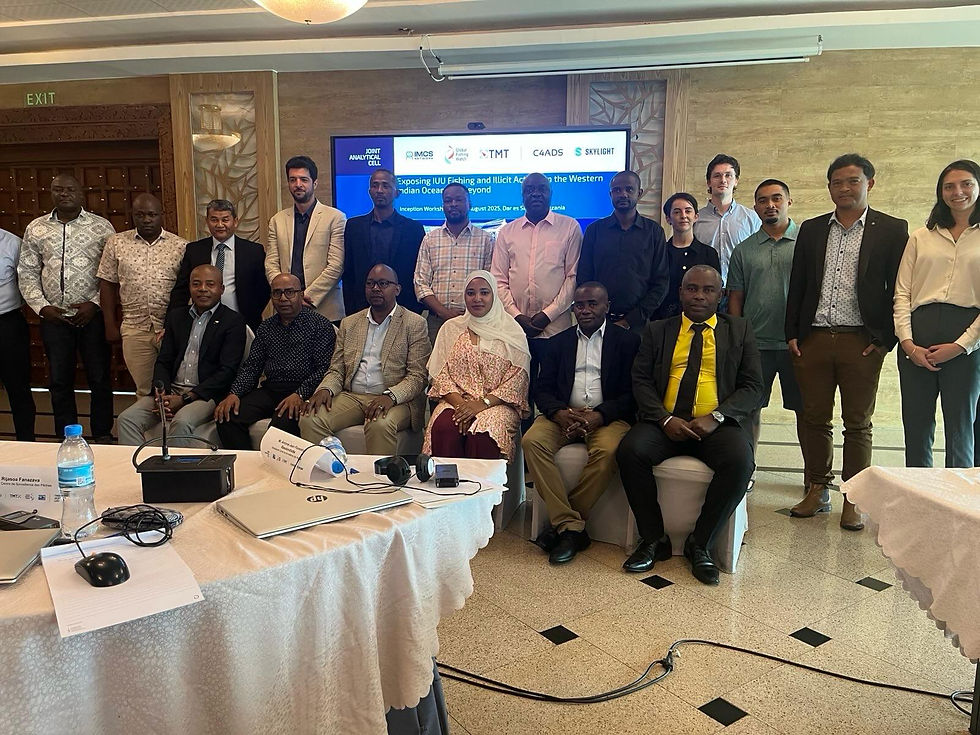- eduartstrazimiri9
- Sep 29, 2025
- 3 min read

Illegal, unreported and unregulated (IUU) fishing continues to pose one of the greatest threats to sustainable fisheries, effective ocean governance, healthy marine ecosystems, and the livelihoods of coastal communities in the Western Indian Ocean (WIO). Addressing this challenge requires stronger cross-border collaboration, enhanced capacity, and timely, actionable intelligence.
The Joint Analytical Cell (JAC) organized a regional workshop held in Dar es Salaam, Tanzania, on 26–27 August 2025. The event marked the official launch of a U.S. State Department-funded initiative, Exposing IUU Fishing and Illicit Activity in the WIO and Beyond through Capacity Building, Actionable Analysis, and Regional Collaboration. The project aims to provide intelligence, analytical support, and capacity building to strengthen national and regional fisheries patrol operations.
The Joint Analytical Cell
The JAC combines the expertise of C4ADS, Global Fishing Watch, International Monitoring, Control and Surveillance Network (IMCSN), Skylight and Trygg Mat Tracking (TMT). Together, these organisations provide states and regional bodies with access to practical analysis and innovative monitoring tools. By pooling resources and knowledge, the JAC helps authorities identify high-risk vessels, strengthen patrol planning and increase enforcement capacity.
Regional participation and collaboration
The workshop brought together representatives from fisheries MCS agencies of Comoros, Kenya, Madagascar and Tanzania, along with the Indian Ocean Commission (IOC), which coordinates the Regional Fisheries Surveillance Plan (PRSP). Established in 2007, the PRSP is a key regional mechanism for joint fisheries patrols and MCS cooperation, now spanning seven participating States.
Harnessing technology for effective enforcement
As IUU fishing networks adapt and exploit enforcement gaps, regional actors increasingly recognise the need for innovative and cost-effective surveillance tools. This project, designed in close alignment with IOC-PRSP priorities, leverages emerging maritime domain awareness (MDA) platforms that are increasingly accessible and affordable.
Through the JAC, partners will deliver access and training on no-cost, open-source tools such as the Global Fishing Watch Map, Skylight, Triton and CRAVT. These tools will be integrated into fisheries patrol planning and operations—helping authorities to identify high-risk vessels in near real-time, optimize limited enforcement resources, and maximize the deterrence impact of patrols.
Strengthening national and regional systems
Participants shared perspectives on national MCS priorities, patrol planning processes, and inter-agency cooperation. The IOC presented achievements of the PRSP to date and described how regional patrols are jointly organized through the Regional Coordination Unit (RCU), including data sharing via the regional Vessel Monitoring System (VMS) and pooling of assets and inspectors.
JAC members introduced the suite of analytical and training modules to be rolled out in the four beneficiary countries, tailored for pre-patrol, live, and post-patrol phases. These modules build on lessons learned from other regions, including West Africa and the Pacific, and from JAC’s recent direct involvement in two PRSP patrols, where pilot analytical support was successfully provided.
Country representatives, the IOC and JAC partners discussed priority needs and upcoming national and regional patrols around which project activities will be organized in 2026. With a focus on risk-based planning and intelligence-led operations, these efforts will strengthen the capacity of national authorities and reinforce the role of the RCU in regional coordination.
Participants welcomed the timely launch of this project, particularly as the PRSP navigates important transitions in its funding and institutional framework. In closing remarks, Chargé d'Affaires ad interim Andrew Lentz of the U.S. Embassy in Dar es Salaam reaffirmed the United States’ commitment to supporting WIO coastal States in their efforts to combat IUU fishing.




